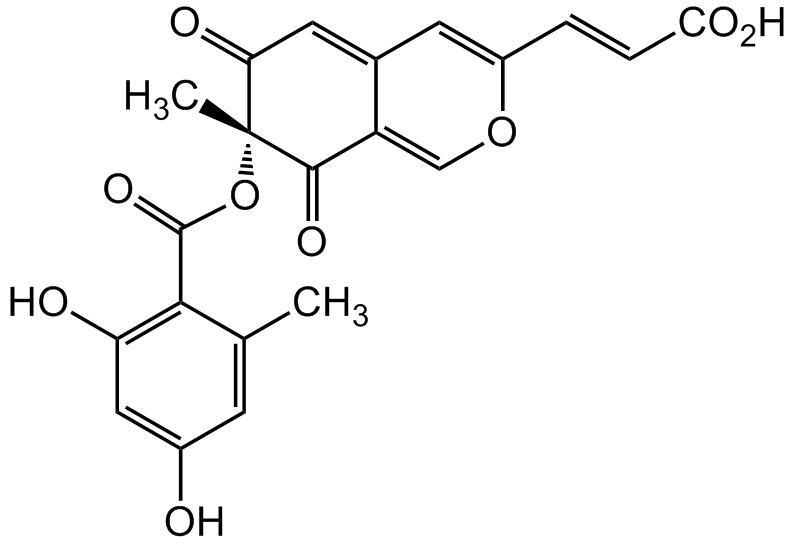
Chemical Structure
(-)-Mitorubrinic acid [58958-07-9] [58958-07-9]
AG-CN2-0505
CAS Number58958-07-9
Product group Chemicals
Estimated Purity>90%
Molecular Weight412.4
Overview
- SupplierAdipoGen Life Sciences
- Product Name(-)-Mitorubrinic acid [58958-07-9] [58958-07-9]
- Delivery Days Customer10
- CAS Number58958-07-9
- CertificationResearch Use Only
- Estimated Purity>90%
- Molecular FormulaC21H16O9
- Molecular Weight412.4
- Scientific DescriptionAzaphilone fungal metabolite. Induces formation of chlamydospore-like cells in fungi. Trypsin inhibitor (IC50=16microg/ml). Mitorubrinic acid was shown to be a virulence factor of Penicillium marneffei by improving its intracellular survival in macrophages. P. marneffei is the most important thermal dimorphic fungus causing respiratory, skin and systemic mycosis in China and Southeast Asia. It is a common indicator disease of AIDS. Besides HIV positive patients, P. marneffei infections have been reported in other immunocompromised patients, such as transplant recipients, patients with systemic lupus erythematosus and on corticosteroid therapy. - Chemical. CAS: 58958-07-9. Formula: C21H16O9. MW: 412.4. Isolated from Penicillium sp. Azaphilone fungal metabolite. Induces formation of chlamydospore-like cells in fungi. Trypsin inhibitor (IC50=16microg/ml). Mitorubrinic acid was shown to be a virulence factor of Penicillium marneffei by improving its intracellular survival in macrophages. P. marneffei is the most important thermal dimorphic fungus causing respiratory, skin and systemic mycosis in China and Southeast Asia. It is a common indicator disease of AIDS. Besides HIV positive patients, P. marneffei infections have been reported in other immunocompromised patients, such as transplant recipients, patients with systemic lupus erythematosus and on corticosteroid therapy.
- SMILESO=C1[C@@](C)(OC(C2=C(O)C=C(O)C=C2C)=O)C(C3=COC(/C=C/C(O)=O)=CC3=C1)=O
- Storage Instruction-20°C,2°C to 8°C
- UNSPSC12352200
